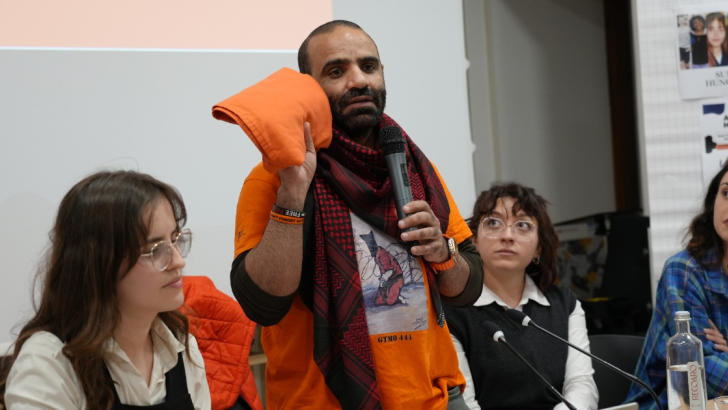(Sexist) talk is(n’t) cheap

The famous saying suggests a great gap between words and deeds, as if words were something other than reality. Attention to words frequently triggers resistance, accusations of pedantry, artificiality, and even uselessness. Yet, in our lives, many things that matter are sealed only by words: a marriage, an employment contract, a value enshrined in our Constitution. Those words matter. Every word is a fact, which establishes something while keeping others silent: it constructs, recognizes, or denies identity. A word is an action and, if sexist, it will be a sexist action.
A parent knows well the emotion of being called “dad” or “mom” for the first time: being named, recognized, carries great significance. This happens because social roles are made explicit through words, and the more relevant these roles are to us, the more the words defining them matter: they establish a sense of belonging, meaning, and purpose; they make explicit to ourselves and others who we are. When this is taken away from us (for example by denying us legal recognition of parenthood), we feel hurt and excluded. Gender is a relevant social category that we learn from infancy and that allows us to organize and understand things around us. In the Italian language, whose grammar marks gender in many words (nouns, adjectives, verbs...), this relevance can turn into exclusion when the generic masculine is used (e.g., "Dear (masculine)" in a letter addressed to both women and men), which is only "generic" in grammatical label: research shows that using the masculine grammatical gender evokes masculine exemplars. Researcher Dagmar Stahlberg shows that by asking people to name, for example, "potential candidates (masculine)" for a political role, we will obtain a prevalence of male candidates, a prevalence that is reduced with the dual form "potential candidates (masculine) or candidates (feminine)".
Another small detail that contributes to gender asymmetries in visibility and importance, is word order. Typically, when naming a couple (Adam and Eve), we tend to name the person we consider most important first (for example, when we name a couple of friends, the person mentioned first is the one closest to us). This order effect results in a gender asymmetry, as men are more likely than women to be mentioned first and represented on the left in both scientific graphs and images (e.g. in art or spontaneous drawings). Positioning men first or on the left supports the stereotype according to which men are more central, dominant, and active (i.e., have more "agency") than women. This is also due to script direction: since we write from left to right, we position the subject (who performs the action) at the beginning - and therefore on the left - of the sentence.
The centrality and dominance of men are reiterated in many other linguistic asymmetries, for example by using more verbs (a grammatical expression that conveys agency) when we talk about men, or by using men as reference point in comparisons (e.g., “With respect to men, women are more..."). These choices confirm and reinforce gender stereotypes, and are so pervasive in language that artificial intelligence clearly replicates them; for example, they associate female politicians with words related to beauty or marital status, and men with characteristics relevant to the position (for example “bold” or “renowned”).
Language also plays a central role in legitimizing gender violence. The passive form, for example, is used more frequently in describing violence against women ("Woman killed..."). Using the victim as the subject of the sentence, as we have seen, implies an attribution of agency and therefore responsibility. In other words, when violence is described in the passive voice, the victim is held more responsible for the event (victim blaming), which we know is associated with a lower intention to help among bystanders. This effect is greater in people who legitimize gender violence, for whom it is sufficient to depict the victim on the left to increase victim blaming.
If this is the power held by subtle elements of language, such as grammatical gender or word order, it is easy to imagine the impact that more explicit and serious forms of linguistic violence can have. Slurs (racist, homophobic, sexist.. insults) insult people on the basis of their social identity and, for this reason, hurt much more. Being exposed to denigrating insults increases prejudice and discrimination: a US study, for example, has shown that in states where there is greater use of sexist insults on online social networks, there is a higher frequency of sexual violence. Furthermore, if on the one hand slurs promote violence towards minorities, on the other they are a form of violence in themselves, as they cause suffering in the victims and are associated with disorders such as anxiety, depression, and post-traumatic stress.
Preventing violence, therefore, also goes through language. The adoption of inclusive policies by institutions has a fundamental role. For example, in the city of Padova, our University, developed its guidelines already in 2017, paving the way for the municipality. Despite widespread resistance, literature shows us how inclusive language, although tiring or ugly at the beginning, can be normalized and appreciated within a short time, as in the case of the Swedish neutral pronoun hen. Unfortunately, however, we must curb our enthusiasm, because a single solution does not exist. It is always necessary to adapt language to our communication purposes. For example, what is the best alternative to the generic masculine? Linguistic experiments proved that modern neutral forms (e.g., the English neopronoun “ze”) are effective in fostering inclusion, but with some types of public (e.g., elder people) impersonal forms are preferable (“they”) to facilitate understanding and avoid resistance. The impersonal form, however, will be less suitable for promoting women's participation in STEM, as it is perceived as masculine: in this case, it is better to use feminine forms.
What is crucial is being aware that the way we speak reflects and shapes who we are. Inclusive language represents a concrete opportunity to affirm our values and reduce gender discrimination in the long term, promoting a fairer society.









